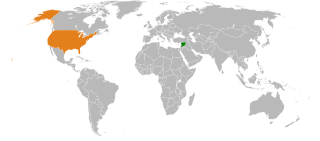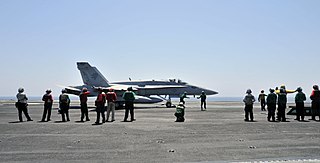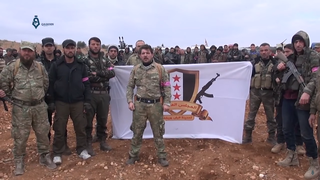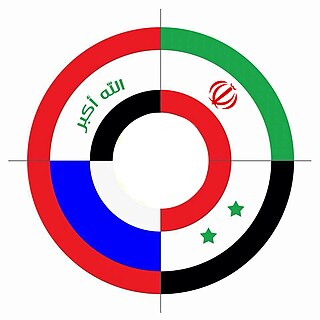This article needs attention from an expert in Netherlands or Arab World. The specific problem is: More information needed and replace out-of-date information.(December 2016) |
This article discusses the Dutch involvement in the Syrian Civil War.
This article needs attention from an expert in Netherlands or Arab World. The specific problem is: More information needed and replace out-of-date information.(December 2016) |
This article discusses the Dutch involvement in the Syrian Civil War.
The Syrian National Council, a coalition of Syrian opposition groups founded in August 2011, is openly supported by the Government of Netherlands. In March 2012, the Dutch Minister of Foreign Affairs Rosenthal had a meeting in the Netherlands with representatives of the Syrian National Council. He emphasized that President Assad should step down and that the Syrian opposition should unite. [1]
In 2014, this Syrian National Council refused to participate in the Geneva II Peace Conference on Syria because participating in those talks would go back on their stance of not entering negotiations until president al-Assad left office. [2] [3]
Apart from international legal justification for (Dutch) war actions against ISIL in Iraq (see Dutch war against ISIL), the Dutch mentioned that the United States had appealed to the right of collective self-defense to justify their US air attacks on ISIL in Syria to prevent an alleged immediately imminent armed attack from ISIL in Syria on Iraq. [4] The Dutch government apparently tacitly consented to their ally the US thus extending their allied war on ISIL to Syrian territory.
All parties in the Dutch Parliament (150 seats), except two, supported this allied war in Iraq and Syria: the opposition came from the Socialist Party (15 seats) and the Party for the Animals (2 seats). [5]
The reasons for the Netherlands to join that American-led war on ISIL in both Iraq and Syria were: [4]
The purposes of that US-initiated war were according to the Dutch government: [4]
The strategy on Syrian territory was described by the Dutch government as coalition air attacks on ISIL. [4]
On 24 September 2014, the Government of the Netherlands decided to take part in “the military campaign” against ISIL (ISIS) which, as the Dutch claimed, had been started by the United States with the U.S. military operations in Iraq against ISIL (since 8 August 2014) and the U.S.-led military operations in Syria against ISIL (since 22 September 2014). [4] [6] [7]
The government of the Netherlands designated €70 million to fund Syrian rebel groups fighting the government of Bashar al-Assad. It provided support to at least 22 rebel groups in Syria from 2015 to early 2018. [8]
In an update to the official Dutch purposes and plans, sent to the Dutch Parliament on 15 December 2014, [9] the purposes of their coalition war against ISIL were still as described in September 2014 to include military support to what they call “the moderate Syrian opposition”. [9] The answers of the Dutch government given in February 2015 to Parliament made clear that, for the Dutch, "moderate Syrian opposition" meant only some (not all) groups that are part of the Free Syrian Army (FSA); for fear of “possible negative consequences” and because of “the sensitivity of revealing support to specific groups”, the government would not say which groups within FSA are being supported by the coalition. [10]
While no new statements were made about legal justification for the military support to what they call “moderate Syrian opposition”, "stopping ISIL’s advance" or "breaking ISIL’s military force", that justification was still a presumed right of collective self-defense (see September 2014) to prevent an immediately imminent armed attack from ISIL in Syria on Iraq. [4] [9]
In June 2015, the Dutch decided to continue their participation in this allied war against ISIL in Syria and Iraq until October 2016. [11]
On 29 January 2016, the Netherlands decided to “intensify” the Dutch contribution to the fight against ISIL in Iraq and Syria. [12] [13]
Militarily, this encompassed: [12] [14]
The air attacks would be performed by the same F-16 squadron already acting in Iraq (see Dutch war against ISIL). [13]
This time the opposition in the Dutch Parliament (150 seats) was larger than it was in September 2014. Opposed to this intensification of the fight against ISIL were now the Socialist Party (15 seats), GroenLinks (green-left) (4 seats), Partij voor de Dieren (Party for the Animals) (2 seats), Group Kuzu/Öztürk (2 seats) and representative Norbert Klein. [15]
In September 2018, the public prosecution department of the Netherlands declared a rebel group that it had previously supported, the Levant Front, to be a "criminal organisation of terrorist intent", describing it as a "salafist and jihadistic" group that "strives for the setting up of the caliphate". [8]
Support for Jabhat al-Shamiya
According to a revelation came in a news report on Nieuwsuur, the government of the Netherlands gave “non-lethal assistance” (NLA) to 22 armed rebel groups which Dutch prosecutors had labeled a ‘terrorist’ organization. [16] One of the groups has been identified as Jabhat al-Shamiya, which had been supplied with uniforms, vans and other equipment.[ citation needed ]

Diplomatic relations between Syria and the United States are currently non-existent; they were suspended in 2012 after the onset of the Syrian Civil War. Priority issues between the two states include the Arab–Israeli conflict, the Golan Heights annexation, Iraq War, alleged state-sponsorship of terrorism, occupation of Lebanon, etc.

Iraq–Syria relations are the bilateral/diplomatic relations between the sovereign states of Iraq and Syria. Both nations are neighbours and they share the Iraq–Syria border. Relations are marked by long-shared cultural and political links, as well as former regional rivalry. The two countries took their present form after the Sykes–Picot Agreement to dismember the Ottoman Empire into British and French spheres of influence after World War I.
This is a broad timeline of the course of major events of the Syrian civil war. It only includes major territorial changes and attacks and does not include every event.

The Syrian opposition is the political structure represented by the Syrian National Coalition and associated Syrian anti-Assad groups with certain territorial control as an alternative Syrian government.

Russia has supported the administration of incumbent President Bashar al-Assad of Syria since the beginning of the Syrian conflict in 2011: politically, with military aid, and with direct military involvement. The 2015 deployment to Syria marked the first time since the end of the Cold War in 1991 that Russia entered an armed conflict outside the borders of the former Soviet Union.

Foreign involvement in the Syrian civil war refers to political, military and operational support to parties involved in the ongoing conflict in Syria that began in March 2011, as well as active foreign involvement. Most parties involved in the war in Syria receive various types of support from foreign countries and entities based outside Syria. The ongoing conflict in Syria is widely described as a series of overlapping proxy wars between the regional and world powers, primarily between the United States and Russia as well as between Iran and Saudi Arabia.

The U.S.–Russia peace proposals on Syria refers to several American–Russian initiatives, including joint United States–Russia proposal issued in May 2013 to organize a conference for obtaining a political solution to the Syrian Civil War. The conference was eventually mediated by Lakhdar Brahimi, the United Nations peace envoy for Syria.
A number of states and armed groups have involved themselves in the ongoing Syrian civil war as belligerents.

Many states began to intervene against the Islamic State, in both the Syrian Civil War and the War in Iraq (2013–2017), in response to its rapid territorial gains from its 2014 Northern Iraq offensives, universally condemned executions, human rights abuses and the fear of further spillovers of the Syrian Civil War. These efforts are called the War against the Islamic State, or the War against ISIS. In later years, there were also minor interventions by some states against IS-affiliated groups in Nigeria and Libya. All these efforts significantly degraded the Islamic State's capabilities by around 2019–2020. While moderate fighting continues in Syria, as of 2024, ISIS has been contained to a manageably small area and force capability.
The Islamic State of Iraq and the Levant (ISIL) is proscribed as a terrorist organisation by the United Kingdom. British citizens have fought as members of the group, and there has been political debate on how to punish them. On 26 September 2014, Parliament voted to begin Royal Air Force airstrikes against ISIL in northern Iraq at the request of the Iraqi government, which began four days later, using Tornado GR4 jets. On 2 December 2015, the UK Parliament authorised an extension to the Royal Air Force airstrike campaign, joining the US-led international coalition against ISIL in Syria. Hours after the vote, Royal Air Force Tornado jets began bombing ISIL-controlled oilfields.

On 22 September 2014, the United States officially intervened in the Syrian civil war with the stated aim of fighting the Islamic State as part of Operation Inherent Resolve in the international war against the Islamic State. The U.S. also supports the Syrian rebels and the Kurdish-led Syrian Democratic Forces opposed to both the Islamic State and Syrian president Bashar al-Assad.

On 15 June 2014, U.S. President Barack Obama ordered United States forces to be dispatched in response to the Northern Iraq offensive of the Islamic State (IS) as part of Operation Inherent Resolve. At the invitation of the Iraqi government, American troops went to assess Iraqi forces and the threat posed by ISIL.

Turkey's involvement in the Syrian Civil War began diplomatically and later escalated militarily. Initially, Turkey condemned the Syrian government at the outbreak of civil unrest in Syria during the spring of 2011; the Turkish government's involvement gradually evolved into military assistance for the Free Syrian Army in July 2011, border clashes in 2012, and direct military interventions in 2016–17, in 2018, in 2019, 2020, and in 2022. The military operations have resulted in the Turkish occupation of northern Syria since August 2016.

The Jordanian military intervention in the Syrian Civil War began on 22 September 2014, with airstrikes on Islamic State of Iraq and the Levant (ISIL) targets, and escalated after the murder of Muath al-Kasasbeh, a Jordanian pilot who was captured by ISIL when his F-16 Fighter Jet crashed over Syria in early 2015. Though Jordan's strikes in Syria largely tapered off after December 2015, airstrikes have continued through February 2017, and Jordan has continued to support rebel groups in Syria and host military activities of other countries.

The Russia–Syria–Iran–Iraq coalition, also referred to as 4+1, is a joint intelligence-sharing cooperation between opponents of the Islamic State (IS) with operation rooms in Syria's Damascus and Iraq's Green Zone in Baghdad. It was formed as a consequence of an agreement reached at the end of September 2015 between Russia, the Islamic Republic of Iran, Iraq and the Syrian Arab Republic to "help and cooperate in collecting information about the terrorist Daesh group" (ISIL) with a view to combatting the advances of the group, according to the statement issued by the Iraqi Joint Operations Command. The statement also cited "the increasing concern from Russia about thousands of Russian terrorists committing criminal acts within ISIS."
The Dutch military intervention against the Islamic State began in 24 September 2014, the Dutch government decided to participate in the military campaign against ISIL. According to NBCnews.com, the Netherlands did not feel legally justified to fight in Syria. The Royal Netherlands Air Force committed six F-16 fighter jets to the war effort. Operations concluded on 2 January 2019.
Collaboration with the Islamic State refers to the cooperation and assistance given by governments, non-state actors, and private individuals to the Islamic State (IS) during the Syrian Civil War, Iraqi Civil War, and Libyan Civil War.
The September 2016 Deir ez-Zor air raid was a series of 37 U.S.-led Coalition airstrikes near the Deir ez-Zor Airport in eastern Syria on 17 September 2016, lasting from 3:55 p.m. to 4:56 p.m. Damascus time in which Syrian Arab Army (SAA) soldiers were killed conducting operations against the Islamic State. Russia reported that at least 62 SAA soldiers were killed, while the Syrian Observatory for Human Rights (SOHR) said at least 80 were killed and 120 wounded. The United States said that the intended target was Islamic State militants and that the attack on Syrian soldiers was due to a misidentification of ground forces while the Syrian and Russian governments claimed that it was an intentional attack against Syrian troops. The attack triggered "a diplomatic firestorm" with Russia calling an emergency United Nations Security Council meeting. Later, the Syrian government called off a ceasefire that had been the result of months of intense diplomatic efforts by the U.S. and Russian governments.
The following is a timeline of the Syrian Civil War from September to December 2018. Information about aggregated casualty counts is found at Casualties of the Syrian Civil War.

Foreign fighters in the Syrian civil war have come to Syria and joined all four sides in the war. In addition to Sunni foreign fighters arriving to defend the Islamic State of Iraq and the Levant or join the Syrian rebels, Shia fighters from several countries have joined pro-government militias in Syria, and leftists have become foreign fighters in the Syrian Democratic Forces.